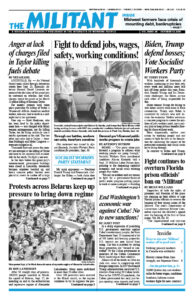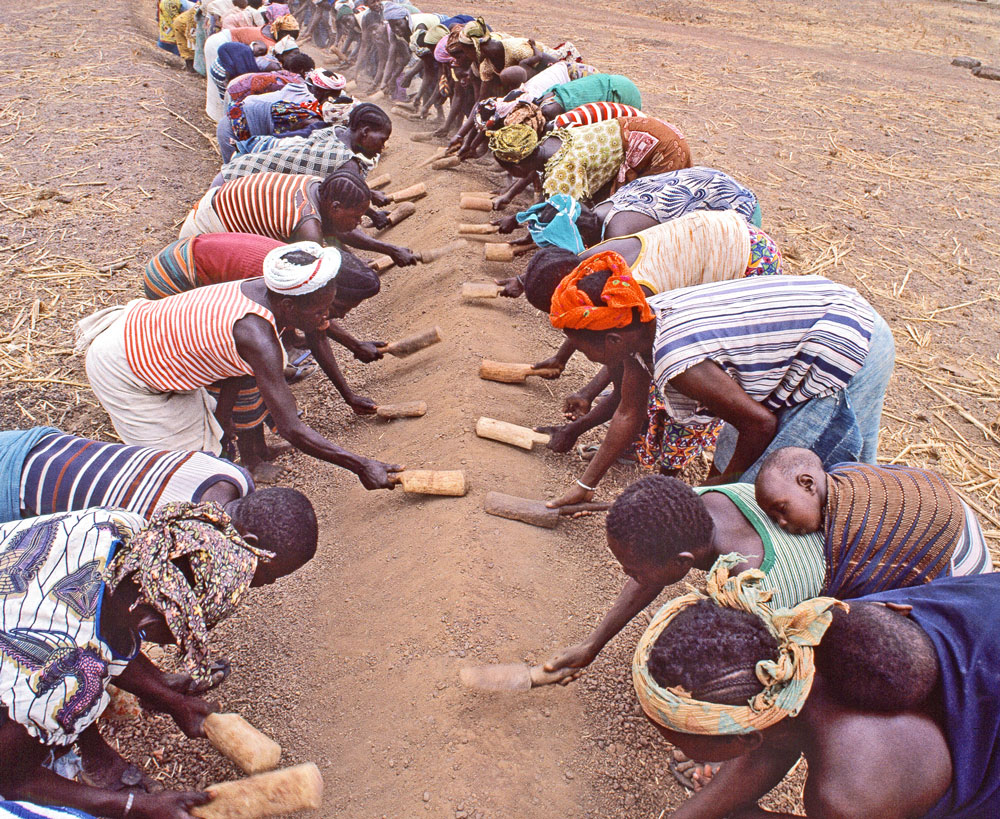Thomas Sankara Speaks is one of Pathfinder’s Books of the Month for October. Sankara was the exemplary leader of a revolution in Burkina Faso, one of the poorest countries in Africa, from 1983 to 1987. His speeches explain how the peasants and workers of this West African country established a popular revolutionary government and began to fight the hunger, illiteracy, and economic backwardness imposed by imperialist domination, and the oppression of women inherited from millennia of class society. The excerpt is from “Imperialism Is the Arsonist of Our Forests and Savannah,” a speech given by Sankara on Feb. 5, 1986, in Paris at the First International Silva Conference for the Protection of the Trees and Forests. Copyright © 2007 by Pathfinder Press. Reprinted by permission.
BY THOMAS SANKARA
My homeland, Burkina Faso, is without question one of the rare countries on this planet justified in calling itself and viewing itself as a distillation of all the natural evils from which mankind still suffers at the end of this twentieth century.
Eight million Burkinabè have painfully internalized this reality for twenty-three years. They have watched their mothers, fathers, daughters, and sons die, with hunger, famine, disease, and ignorance decimating them by the hundreds. With tears in their eyes, they have watched ponds and rivers dry up. Since 1973 they have seen the environment deteriorate, trees die, and the desert invade with giant strides. It is estimated that the desert in the Sahel advances at the rate of seven kilometers per year.
Only by looking at these realities can one understand and accept the legitimate revolt that was born, that matured over a long period of time, and that finally erupted in an organized way the night of August 4, 1983, in the form of a democratic and popular revolution in Burkina Faso. …
After having vaccinated throughout the national territory, in two weeks, 2.5 million children between the ages of nine months and fourteen years — children from Burkina Faso and from neighboring countries — against measles, meningitis, and yellow fever; after having sunk more than 150 wells assuring drinking water to the 20 or so districts in our capital that lacked this vital necessity until now; after having raised the literacy rate from 12 to 22 percent in two years — the Burkinabè people victoriously continue their struggle for a green Burkina.
Ten million trees were planted under the auspices of a fifteen-month People’s Development Program, our first venture while awaiting the five-year plan. In the villages and in the developed river valleys, families must each plant one hundred trees per year. …
I have come to join with you in deploring the harshness of nature. But I have also come to denounce the ones whose selfishness is the source of his fellow man’s misfortune. Colonial plunder has decimated our forests without the slightest thought of replenishing them for our tomorrows. …
We are not against progress, but we do not want progress that is anarchic and criminally neglects the rights of others. We therefore wish to affirm that the battle against the encroachment of the desert is a battle to establish a balance between man, nature, and society. As such it is a political battle above all, and not an act of fate. …
We must fight to find the financial means to exploit our existing water resources — drilling operations, reservoirs, and dams. This is the place to denounce the one-sided contracts and draconian conditions imposed by banks and other financial institutions that doom our projects in this field. It is these prohibitive conditions that lead to our countries’ traumatizing debt and eliminate any meaningful maneuvering room.
Neither fallacious Malthusian arguments — and I assert that Africa remains an underpopulated continent — nor the vacation resorts pompously and demagogically christened “reforestation operations” provide an answer. We and our misery are spurned like bald and mangy dogs whose lamentations and cries disturb the peace and quiet of the manufacturers and merchants of misery.
That is why Burkina has proposed and continues to propose that at least 1 percent of the colossal sums of money sacrificed to the search for cohabitation with other stars and planets be used, by way of compensation, to finance projects to save trees and lives. We have not abandoned hope that a dialogue with the Martians might lead to the reconquest of Eden. But in the meantime, earthlings that we are, we also have the right to reject a choice limited simply to the alternatives of hell or purgatory.
Explained in this way, our struggle for the trees and forests is first and foremost a democratic and popular struggle. Because a handful of forestry engineers and experts getting themselves all worked up in a sterile and costly manner will never accomplish anything! Nor can the worked-up consciences of a multitude of forums and institutions — sincere and praiseworthy though they may be — make the Sahel green again, when we lack the funds to drill wells for drinking water a hundred meters deep, while money abounds to drill oil wells three thousand meters deep!
As Karl Marx said, those who live in a palace do not think about the same things, nor in the same way, as those who live in a hut. This struggle to defend the trees and forests is above all a struggle against imperialism. Because imperialism is the arsonist setting fire to our forests and our savannas. …
Yes, the problem posed by the trees and forests is exclusively the problem of balance and harmony between the individual, society, and nature. This fight can be waged. We must not retreat in face of the immensity of the task. We must not turn away from the suffering of others, for the spread of the desert no longer knows any borders.
We can win this struggle if we choose to be architects and not simply bees. It will be the victory of consciousness over instinct. The bee and the architect, yes! If the author of these lines will allow me, I will extend this twofold analogy to a threefold one: the bee, the architect, and the revolutionary architect.


